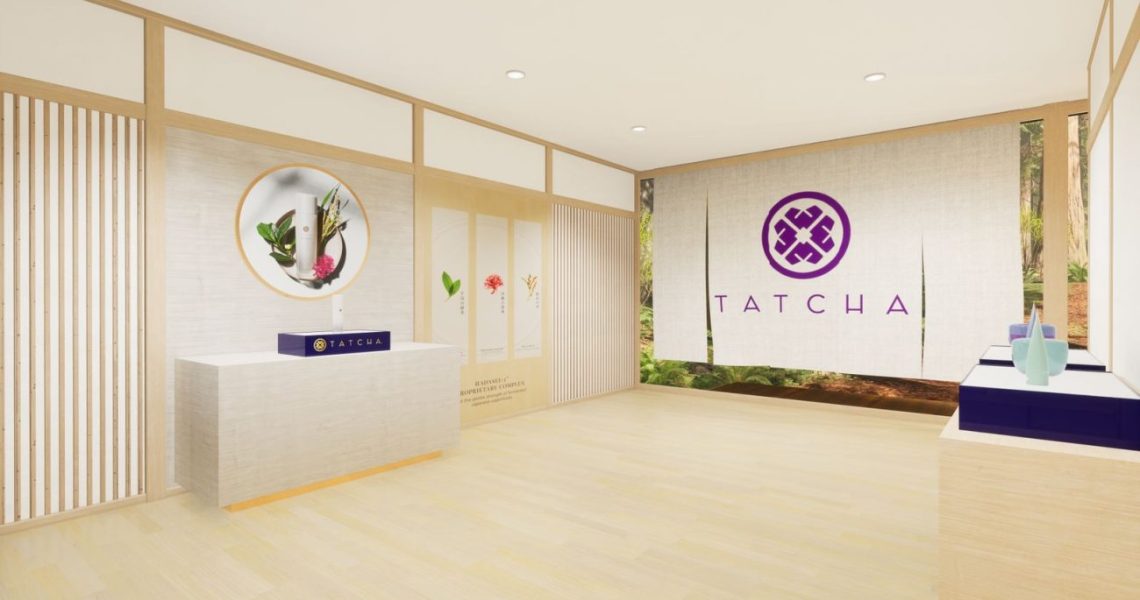Tatcha is taking an IRL and URL approach to marketing its Forest Awakening body care collection, which first debuted in late 2022.
Launched in February, both experiences were built around the concept of forest bathing, which refers to the Japanese practice of spending time in nature. They also focused on stress reduction, which Tatcha has invested in becoming an authority on over the past year — in 2022, the brand conducted a study on the impacts of stress.
For the IRL portion of the campaign, the brand opened its first-ever pop-up at the Los Angeles mall The Grove, from February 17-19. It invited press and influencers to preview the experience and create content, and also welcomed the general public to experience the buildout.
The pop-up encompassed a meditation room, a product showroom and other interactive experiences. For those who made a wish and tied it to the brand’s wishing tree, the brand donated one day of school through Tatcha’s ongoing philanthropic partnership with Room to Read, which supports children’s literacy and girls’ education. Guests could also receive haikus written on-site, as well as “Tatcha Matchas.”
“Most of the people who came through the physical experience spent at least 8-10 minutes. They shared with us that it left them feeling calm, rebalanced and refreshed,” said Tatcha CEO Mary Yee, referring to verbal feedback received on-site.
The experiential nature of the pop-up also proved impactful from a sales and brand visibility perspective. Yee said the brand saw a spike in sales at The Grove’s Sephora location — so much so that it had to direct customers to order online, as the store sold out of certain items. “[This] Sephora saw equivalent to one month of in-store sales in just three days,” she said.
“It’s costly to do these types of experiences, but they do translate to sales,” Yee said.
By inviting influencers to organically attend and post from the pop-up, the brand also saw over 9 million social media impressions.
The corresponding digital experience — which can still be accessed via the brand’s website and is promoted on its homepage — also had facets devoted to relaxing experiences, as well as more product-focused ones. For example, the Awakening Onsen room introduces visitors to the brand’s three-piece Hinoki body collection, which sits atop a serene virtual sink and can each be clicked for further education. Meanwhile, the Skin Care Ritual Room serves as a virtual storefront of sorts — the brand’s products are on display in a virtual shoplike setting, and descriptions are available for each. Finally, the Forest Escape and Meditation House both feature short, recorded meditations by zen monk Toryo Ito, the brand’s well-being ambassador.
The brand has promoted the digital experience in marketing emails and on social media. It will remain on the brand’s website for the foreseeable future.
The digital experience is also expected to prove impactful. In a previous iteration of a digital room dedicated to the brand’s Indigo Overnight Repair product, launched in November 2021, it saw a 26% increase in time spent on the site and a 50% increase in basket size, Yee said. “We know that investing in education and engagement will ultimately translate into sales,” she said. She added that it’s too early to report results on the current digital room as it’s still live.
“It was important for the brand to invest in both digital and physical iterations of the activation, because, consumers [no longer] think of offline and online as separate,” said Yee.
The goal for both “was to create a meaningful and immersive experience for our guests that allow them to better understand the Tatcha brand ethos, rooted in our belief in the skin-mind connection,” said Tatcha CMO Kylene Campos.




